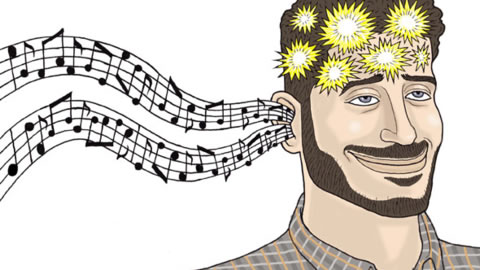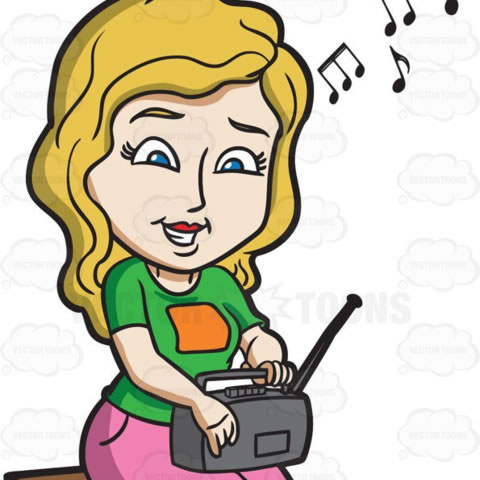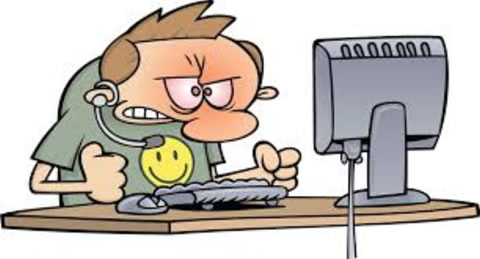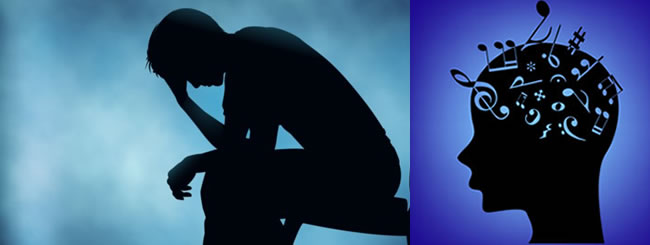Strange Bedfellows
As far back as I can remember I’ve been in love with both music and psychology. As a child I’d take time between singing songs with the radio to inexplicably ask my parents things like, “Why are some people happy and some sad?” and “Why do people fight? When I got older I took time between playing rock n roll shows to move to Zurich, Switzerland and become a psychologist.
“Woah, now what am I going to do?” I fretted. “I can’t be a full time psychotherapist and a full-time musician.”
Or can I? I decided to go for it—professional by day, rocker by night. Having two careers was a difficult balancing act until I realized they’re actually one and the same endeavor. I don’t mean this in the music therapy sense; that’s not what I do. For me, music is therapy and therapy is music.
Now, I live back in the U.S. where I coach clients and play music, and it all feels like one exciting project.

Well, that’s exactly what occurs when I write a song. I enter into an altered state and wait for something to happen—a raw emotion, a mysterious image, a phrase out of left field, or an insight that surprises me. It’s a fishing expedition into the unknown and I return home with either nothing or with a nice catch. When the latter happens I feel like I just had a therapy session with the great guru, except that it’s just me, my guitar, and the sound waves. Sometimes people have a similar experience when they listen to their favorite tunes.
Great songs make you feel and think in a way that connects you to something deeper, truer, more real, and more ecstatic than your usual experience of life. That’s the power of music. It’s a superhighway into your subconscious—the feelings, thoughts and ways of being that reside in you but only as potentials, not as lived realities.

What Connects Psychotherapy And Music?
The central connecting point between psychotherapy and music is the concept of process. Contrary to conventional wisdom, human problems aren’t pathological even though they cause pain; they’re meaningful processes designed to force you to grow at a deep level. We’re so used to thinking of trouble in our lives as something wrong. We look at our problems as meaningless garbage to throw in the trash. We look for quick fixes and distractions in our attempt to get away from what’s bothering us. But this attitude is actually counterproductive. It’s one of the reasons people suffer from the same issues for years, decades, or even whole lifetimes.
A problem is your personal growth process trying to happen, and that’s how you should approach it. Listening to your favorite music is also your personal growth process trying to happen, although we don’t usually think of it this way. You’re drawn to certain music because it gives you an experience you need more of in your life. It makes you feel things that are already within you but you don’t have access to… until your song rocks the radio!

Psychology Says The Mind Is Like A Computer But It’s Not – The Mind Is Like Music
Over the last hundred years psychologists have put forth a variety theories to understand the human mind. They’ve used things like clocks, looms, and telephone switchboards to try to illustrate how the mind works. The most current theories draw on computer science.
There are lots of ideas within this approach but they’re all flawed in some way. They view the mind as a static entity like a machine run by software that sometimes malfunctions. A personal problem is seen as a software glitch you have to fix.
The fault with this way of thinking is that human experience is based on what things mean to us whereas computer language is simply a series of 0’s and 1’s that don’t relate to meaning at all. A computer doesn’t find one particular thought or feeling any more meaningful than another. The mind simply doesn’t adhere to these kinds of mechanistic models because it’s not a static entity with a fixed set of instructions; it’s a fluid process driven by meaning.

You might be thinking, “But wait, isn’t a musical note such an entity?” Yes, but one note is not music; music is created by how notes (and other musical elements) interact with each other. It’s made up of dynamic relationships that create meaning on an emotional level, not of set components.
There isn’t even really such “thing” as a C-major scale; that’s just one of infinite ways the human mind can arrange an endless number of notes. The notes are just the raw materials for the musical process.
It’s the same with your problems; your depression, anxiety, or relationship issue is not a malfunction in a mind-machine like a software error in a computer. It’s a meaningful process that presents you with the raw materials for transforming who you are. Your difficulty is like a song—an emotional process with a message. That which causes you pain contains the hidden music of your personal growth.

Music’s Transformative Power *
I like to say that therapy helped me but rock n roll saved me. Music has mysterious powers that can bypass all the noise in your life. I don’t intentionally use music when I work with clients but sometimes it finds its way in on its own. I want to tell you about Sandy,* a 46 year-old client who had a strange musical experience in our session. Find out how a song changed her life in my blog post, How One Song Healed a Year of Sadness.
*Client names have been changed.


